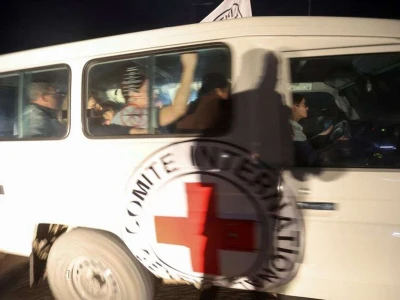
Hamas hands over two female hostages, others expected after truce extended
Those who fled the north of the Gaza Strip, including Gaza City, have still been blocked from returning.
GAZA/TEL AVIV, Nov 30 (Reuters) - Hamas on Thursday handed two female hostages to the Red Cross in Gaza City's central Palestine Square and further hostages are expected to be released later in the evening following a last-minute deal struck with Israel to extend a truce.
Israel identified the freed hostages as 21-year-old Mia Schem, who was seized at a dance party along with many of the other hostages abducted into Gaza, and 40-year-old Amit Soussana. Schem also holds French nationality.
Footage aired on Aljazeera showed the women being taken out of a white vehicle surrounded by armed Hamas militants in Gaza City and met by Red Cross officials, amid a throng of onlookers.
Later, photos released by the Israeli Prime Minister's Office showed Schem embracing her mother and brother after they were reunited at Hatzerim military base in Israel.
Israel and Hamas agreed to extend their ceasefire for a seventh day, while mediators pressed on with talks to extend the truce further to free more hostages and let aid reach Gaza.
The truce has halted bombing and allowed some humanitarian aid into Gaza after much of the coastal territory of 2.3 million people was reduced to wasteland in an Israeli campaign in retaliation for a deadly rampage by Hamas militants on Oct. 7.
The armed wing of Hamas claimed responsibility for a deadly shooting in Jerusalem, which Israel called further proof of the need to destroy the militants, although there were no signs of this scuppering the Gaza truce or release of hostages.
Earlier, Israel, which has demanded Hamas release at least 10 hostages per day to hold the ceasefire, said it received a list at the last minute of those who would go free on Thursday, allowing it to call off plans to resume fighting at dawn.
Hamas freed 16 hostages on Wednesday while Israel released 30 Palestinian prisoners.
Mia Schem had appeared in a hostage video released by Hamas in October which showed her injured arm being treated by an unidentified medical worker.
Her father David told Israel's Channel 12 TV on Thursday that when they meet, he will not say a word to her. "I don't want to ask her questions, because I don't know what she endured."
U.S. Secretary of State Antony Blinken, in Israel during his third visit to the Middle East since the war began, said the truce was "producing results." U.S. officials said Blinken also told the Israelis to ensure the safety of Palestinian civilians once the war resumes.
Egypt's state media body said Egyptian and Qatari mediators were working to negotiate a further extension of the truce for two days.
Before Thursday, militants had released 97 hostages during the truce: 70 Israeli women, teenagers and children, each freed in return for three Palestinian women and teenage detainees, plus 27 foreign hostages freed under parallel agreements with their governments.
With fewer Israeli women and children left in captivity, extending the truce could require setting new terms for the release of Israeli men, including soldiers.
THREE KILLED IN JERUSALEM ATTACK
Shortly after the agreement, two Palestinian attackers opened fire at a bus stop during morning rush hour at the entrance to Jerusalem, killing at least three people. Both attackers were "neutralised", police said.
"This event proves again how we must not show weakness, that we must speak to Hamas only through (rifle) scopes, only through war," said hard-right National Security Minister Itamar Ben-Gvir at the site of the attack.
Hamas said the attackers were its members, and its armed wing claimed responsibility for the attack in response "to the occupation's crimes of killing children and women in Gaza".
But neither side appeared to treat the attack as an explicit renunciation of the truce. A Palestinian official familiar with the truce talks said its terms did not apply to what he characterised as responses to Israeli attacks in the West Bank and Jerusalem.
Israel has sworn to annihilate Hamas, which rules Gaza, in response to the Oct. 7 rampage by the militant group, when Israel says gunmen killed 1,200 people and took 240 hostages.
Until the truce, Israel bombarded the territory for seven weeks. Palestinian health authorities deemed reliable by the United Nations say more than 15,000 Gazans have been confirmed killed, around 40% of them children. A further 6,500 are missing, many feared still buried under rubble.
DESTROYED HOMES
According to the United Nations, up to 80% of Gazans have been forced from their homes, including nearly all residents of the northern half, which Israel ordered completely evacuated. Once the truce is over, Israel is expected to extend its ground campaign into the south.
Gazans have been able to use the week-long truce to venture out, visit abandoned and destroyed homes, and dig scores more bodies out of the wreckage. But residents and international agencies say the aid that has arrived so far is still trivial compared to the besieged enclave's vast humanitarian needs.
Those who fled the north of the Gaza Strip, including Gaza City, have still been blocked from returning. Many thousands of families are sleeping rough in makeshift shelters with only the belongings they could carry.
"What is a truce that doesn't bring us back home? Israeli soldiers on tanks fired at us when we tried to go back to check on our homes in Gaza City after we heard it was bombed," said Mohammad Joudat, 25, a displaced business administration graduate, speaking in Deir al-Balah in the southern Gaza Strip.
Related
Related

Sixteen more hostages freed from Gaza as part of truce

Hamas frees 12 hostages, Israel expected to release 30 prisoners

Israel-Hamas war: Four-day truce agreed, 50 hostages to go free

